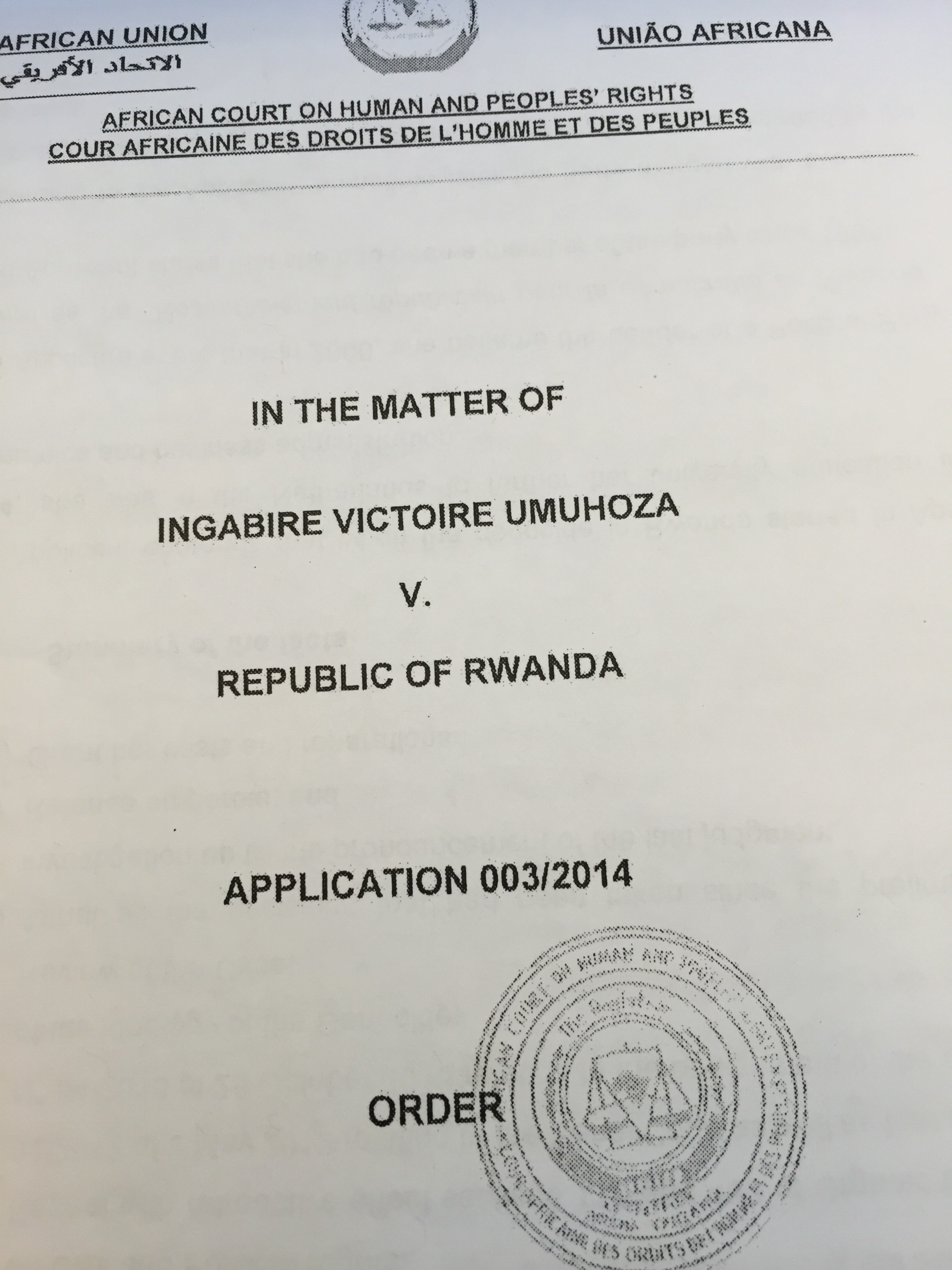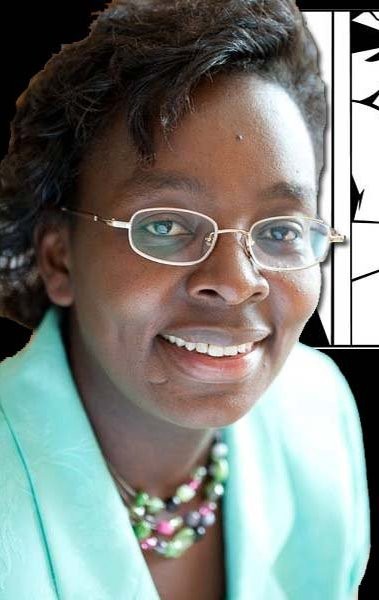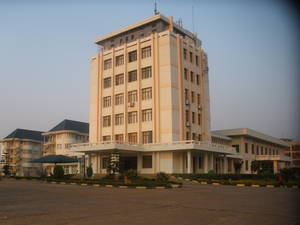A ripple of excitement spread through Monitor HQ in July when the African Court released its latest order in the case of Ingabire v Rwanda.
For those coming to this matter new, the applicant is the currently imprisoned Rwandan opposition political leader Victoire Ingabire. Ingabire alleges violation of various articles of the Universal Declaration on Human Rights, the African Charter and the ICCPR, relating to her right to fair a trial.

The case has yet to have a public hearing, but it is already one of the most interesting cases the Court has dealt with. Why? Because news broke in March this year, on the day the Court was due to hold the public hearing in the case, that Rwanda had withdrawn its Article 34(6) Declaration allowing its citizens and NGOs direct access to the Court (“Special Declaration”), the effect being Ingabire’s case was halted. Exactly how Rwanda had withdrawn and whether the Court was suspending or terminating matters was unclear. The Court’s decision on how to proceed with Rwanda’s withdrawal- ‘Rwexit’ perhaps?- has become an important issue not just for Ingabire but for Rwanda in general and also across the continent as other countries who have signed the Special Declaration watch carefully to see whether they too can withdraw their Special Declaration and at what cost, whilst countries that have not signed the Special Declaration assess what they are potentially signing up for. You can read more about this in my previous posts here and here. I also recommend reading Nani Jansen Reventlow – the recent subject of a Q&A here at the Monitor- piece here.
With all this in mind, what Court observers have been waiting for is the Court’s official decision on whether Rwanda can withdraw its Article 34(6) Special Declaration and if so, when it takes effect and how it will effect cases currently pending before the Court including Ingabire’s. Excitement at Monitor HQ over this latest order was somewhat tempered however as it became clear that this order was an intermediate order on procedural matters, rather than a decision on the substantive issue of Rwanda’s withdrawal. Paragraph 31 tells you pretty much all you need to know. It reads: “this Order is with respect to the procedural matters raised by the Applicant as alluded to in paragraph 24 above”.
Whilst the order therefore does not address the substantive issue of Rwanda’s Special Declaration withdrawal, it does address a number of important matters raised by Ingabire’s legal team and contains some interesting findings that deserve to be examined a little closer.

In particular, the Court considered four requests from Ingabire: (1) for the Court to reject an amicus brief; (2) for the Court to facilitate access between Ingabire and her legal team; (3) to facilitate video conferencing technology to allow Ingabire to follow proceedings from Rwanda; and (4) for the Court to order Rwanda to comply with the Court’s previous decision to provide her legal team with legal documents.
For the purposes of this post I want to group the issues into two distinct categories: the first category groups the second (Ingabire’s access to her legal team) and fourth issues (Rwanda’s alleged failure to provide legal documents) together; these are Ingabire’s requests for the Court to order Rwanda to do something. The second category, the first (Amicus Brief) and third (video conferencing) issues are Ingabire’s direct appeals to the Court to do something itself.
With regard to the first category, Ingabire’s legal team complained that the Rwandan authorities have consistently tries to intimidate them by subjecting them to full searches including of confidential legal documents on prison visits and by delaying visas to Ingabire’s co-counsel Caroline Buisman which has prevented her from entering Rwanda to consult with Ingabire. Ingabire’s legal team argues that these tactics have resulted in their inability to prepare their case and undermine Ingabire’s right to an effective remedy.
The Court, relying on Rule 28 and Rule 32 of the Court’ Rules, made clear that Rwanda is required to assist Ingabire and by extension her legal team in order to facilitate proceedings by the Court. The Court stopped short of finding that any searches of persons entering prison would be in violation-lawyers like any other visitor entering a prison can and should be subject to a search- but the Court did make it clear that confidential legal papers should not be subject to search from prison authorities. This is a small but possibly significant finding not only for Ingabire’s legal team but also other lawyers representing clients in prison across Africa. Put simply, authorities can search lawyers as they can any other prison visitor, but they can’t search through legal papers.

As to Rwanda’s failure to file legal documents, the Court seemed unimpressed with Rwanda’s actions. On 7 October 2015 the Court ordered Rwanda to file a slew of relevant legal documents which had until then been unavailable. These documents included national laws, Ingabire’s charge sheets and records of legal proceedings; all of which the Court may want to consider as it considers the merits of the case. The Court noted that Rwanda has expressed its difficulty in complying with the Court’s order as the papers were either with Ingabire or the Rwandan Supreme Court, and that an application would need to be made to the Supreme Court explaining the reasons for the application. The Court was not convinced by this explanation, reasoning that Rule 41 of the Court’s Rules allow the Court to request any documents its deems necessary. It found that since the documents are in the hands of the Rwandan Supreme Court, they are official state documents and therefore also in possession of the Rwanda Attorney General of Rwanda, the figurative respondent on behalf of Rwanda. In short, Rwanda could not rely on an excuse that a different section of the state machine had the papers- if they are public documents and they are in the hands of a state organ then there is not reason why Rwanda could not file them with the Court.
Again, similar to the above point on the confidentiality of legal papers, this decision may appear small, and perhaps even obvious, but it may well be important in future cases when states attempt to hide behind bureaucratic explanations and red tape in order to explain their inability to provide documents required by the Court.
Turning now to the second category of issues- those where Ingabire’s legal team were requesting the Court itself do something- their first issue concerned an amicus brief filed by the National Commission for the Fight Against Genocide organization (NCFAG). Ingabire argued that the Court should reject this amicus brief since the NCFAG is not independent and is in fact an official Rwandan organ responsible to the Rwandan President. The Court, unsurprisingly, found that it was entitled to consider amicus curiae briefs under Rule 45 of the Court’s rules, and that it was for the Court and the Court alone to determine the value and strength of any brief put before it. Why is this decision unsurprising? I suggest that it was also going to unlikely that the Court would make a determination on the status of any brief submitted at this stage. By keeping the amicus brief on the record, the Court is able to consider it if and when it considers the application on the merits. If it considers the brief to be of use it can cite the relevant sections, if it does not consider it useful it can simply not refer to it. This decision therefore neatly sidesteps making any proclamation on the neutrality of the NCFAG and cements the principle that it is for the Court to decide on the relevancy or merits of an amicus brief, not the parties.
Finally, and what is perhaps the most interesting issue, is Ingabire’s request for video conferencing technology. Ingabire requested this technology be provided to allow her to follow proceedings from prison since she is unable to attend court in person. The Court found that personal presence in court is materially distinct from protection of an applicant’s participatory rights. In other words, an applicant has the right to participate in proceedings, most often through counsel or legal representatives, but this does not extend to a right to be present in court per se. In this case Ingabire is in prison and there is no automatic right for her presence, especially where she is represented by counsel in court. Indeed, the Court noted that the Court’s Rules provide no mention of video conferencing as a way of participating in court.
This line of reasoning is fine, and follows established lines on the subject. The interesting point here though is the very fact that the Court’s rules do not entertain the possibility of such technology. What this brings out in the open is the tantalizing possibility of video technology for participation and/or giving evidence. One of the biggest issues facing the Court as it grows and takes on more cases is the sheer size of the continent and the impracticability of many applicants traveling to the Court in Arusha to participate or give evidence. Imagine if applicants could participate in these cases by video-conferencing, or give evidence via video-link. This would open up the court to many more people and help spread the word and raise the profile of the Court.

Again, its worth saying, the Court’s reasoning on this point is fine. What is needed therefore is innovative thinking to make video-conference technology a possibility beyond the limits of the Cpurt’s Rules or by changing them. The technology certainly exists. Imagine if applicants in Accra, Kigali, Dodoma or Ougadougou (to name but a few) need not face the expense, upheaval and stress of traveling to Arusha but could instead follow proceedings from a secure video-conferencing line? Who knows how many cases are currently not pursued due to the perceived remoteness of the Court geographically and figuratively? Bring the Court into the town or village where the applicant lives and the Court becomes relevant and real. The Court does currently run a broadcast of some judgments via the internet, but in my experience this service is patchy at best and it requires an internet connection at fairly high speeds to access even this inconsistent service. The Court needs to get imaginative and proactive on this point. I am no expert on this issue, but do you think Google or some other tech giant wouldn’t be willing and able to provide such service such as this at little or no cost? The answer is I do not know but the Court should be asking- the potential benefits are just too huge to ignore.
So in conclusion,there’s more to come, in the guise of the Court’s actual decision on Rwanda’s withdrawal of its Special Declaration. Of course this interim decision is possibly a strong indicator that the Court is very much treating this case as ongoing and unlikely to finish soon- why go to the bother of issuing these orders if you’re going to terminate the case soon? In any event, the order does however provide some insight into the alleged difficulties Ingabire’s legal team face in preparing this case. Certainly the Court seems to have taken these complaints seriously and set out in no uncertain terms Rwanda’s obligations to file documents and allow client confidentially. The amicus decision is unsurprising but does cement the principle that it is for the Court, not parties, to decide on the usefulness of any briefs before it. The video-conferencing matter, whilst sound in legal reasoning, does present a bigger issue and one that the Court must grasp- make the Court accessible to applicants throughout the process by bringing the Court to them via video and you begin to raise the profile of the Court and allow those to whom the Court is intended to be helping- the people of Africa- maximum exposure to the Court.
